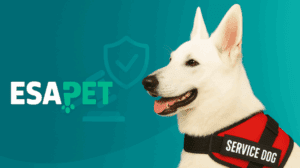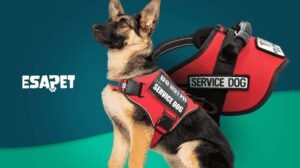Colleges That Allow Pets in Dorms: Service Animals and ESAs

Many colleges now allow pets, service animals, and emotional support animals (ESAs) in dorms. Understanding the difference between these animals is important before choosing a school.
Service animals, usually dogs, are trained to help people with disabilities. They perform specific tasks, like guiding someone who is blind. Under the Americans with Disabilities Act (ADA), service animals can go anywhere their handler goes, including college campuses.
Emotional support animals (ESAs) are different. They provide comfort and companionship but are not trained to do specific tasks. ESAs don’t have the same public access rights as service animals. However, ESAs are protected under the Fair Housing Act (FHA).
This means ESAs can live in dorms with their owners if documentation, like an ESA letter, is provided. Pets, ESAs, and service animals can make college life easier.
They provide emotional and physical support for students, especially those with disabilities or mental conditions. Policies vary by school, so check with the housing office before bringing an animal to campus.
Service Animals and Emotional Support Animals

Service animals and ESAs serve different purposes and have different legal rights. A service animal is typically a dog trained to perform tasks that help a person with a disability. These animals are protected under the ADA, which gives them full public access rights.
An ESA is any domesticated animal that provides emotional support and companionship. Unlike service animals, ESAs are not trained to perform specific tasks. They do not have public access rights under the ADA.
Both service animals and ESAs are protected under the Fair Housing Act (FHA). This means they can live with their owners in housing facilities, including college dorms, even if a “No Pets” policy exists.
Many colleges allow these animals in on-campus housing to support students with disabilities or mental needs. However, policies vary. Most schools need proper documentation, such as an ESA or PSD letter, to verify the student’s disability-related needs.
Service Animals Definition
Service animals are specially trained to perform tasks to assist a person with a disability. These tasks must be directly related to the person’s disability. Here are key points to know about service animals:
- Under the ADA, only a dog (and sometimes a miniature horse) trained to perform specific tasks can be a service animal. No other animal can be a service animal.
- Different types of disabilities qualify for service animals. These include developmental, sensory, mental, and physical disabilities.
- Service animals have public access rights under the ADA. They can go with their handlers to all public places, including college dorms and classes. Management cannot deny them access.
- Businesses cannot request service dog documentation for public access or housing rights.
Emotional Support Animals
ESAs provide emotional support for mental health conditions like PTSD and anxiety. Any domesticated animal, such as cats, dogs, rabbits, or birds, can be an ESA. Since ESAs are not specially trained, they do not have public access rights under the ADA.
Under the Fair Housing Act (FHA), ESAs are allowed in college dorms as a reasonable accommodation. Colleges may need an ESA letter stating your need for the animal due to a mental condition. FHA protections do not extend to classrooms or other areas of campus.
Differences Between ESAs and Service Animals
Common Pet Policies at Pet-Friendly Colleges
Different colleges have varying pet policies, but some common guidelines apply. Many schools allow small mammals like hamsters and rabbits, fish (with tank size limits), and small caged animals like birds. These pets are generally low-maintenance.
Some campuses permit cats and dogs in pet-friendly housing. However, there are often restrictions on breed, size, or weight. Pets are limited to dorms or floors, and students must register their pets with campus housing. Additional pet fees or deposits may apply.
Policies for ESAs and service animals are separate. These animals are protected under the Fair Housing Act (FHA) for housing accommodations, including college dorms.
Small Caged Animals and Fish
Many colleges allow small caged pets like hamsters, gerbils, and certain birds. These animals are usually low-maintenance and unlikely to cause disruptions. However, colleges may have requirements for secure cages for pets allowed.
Fish, especially in non-carnivorous tanks, are also often allowed. Always check if there are any specific size and type restrictions.
Cats and Dogs in Specific Dorms
Some colleges have designated pet-friendly dorms where cats and dogs are allowed. However, there are usually weight and size restrictions. These designated dorms help manage allergies and ensure other students can choose to house without animals.
Colleges may ask students with pets to pay deposits and provide vaccination records. However, service animals and ESAs are usually exempt from these policies.
Restricted Animals
Many colleges have pet policies to ensure all students’ safety, comfort, and well-being. They may restrict certain species and breeds in dorms. Here are common restricted species and breeds in dorms:
What Colleges Allow Pets in Dorms?
Massachusetts Institute of Technology (MIT) (Cambridge, MA)
MIT allows emotional support animals (ESAs) and service animals in on-campus housing. The college has clear policies on documentation, owner responsibilities, and restrictions. Students should contact the housing office for specific guidelines.
ESA & Service Animal Rules at MIT
- MIT does not allow pets in undergraduate or graduate housing. This includes birds, amphibians, mammals, and reptiles.
- Fish are allowed in tanks no larger than 20 gallons.
- East Campus and Random Hall allow a limited number of cats. Cats must be registered with the pet chair, including photos, health records, and written roommate consent.
- Disability and Access Services (DAS) may approve ESAs in on-campus housing with proper documentation.
- Service animals are permitted in on-campus housing, public spaces, and staff areas.
On-Campus Housing & Off-Campus Options
MIT provides on-campus housing and assists students in finding off-campus options if needed. Pets are not allowed in on-campus housing, except for fish in tanks up to 20 gallons.
ESAs may be approved under specific circumstances with proper documentation from Disability and Access Services (DAS). Under the ADA, service animals are permitted across campus, including in on-campus housing.
Students can also keep ESAs and service animals in off-campus housing under the FHA.
Stetson University (DeLand, Florida)
As per FHA and ADA, Stetson University allows students to live with their ESAs and service animals on campus. The college also allows pets. However, there are certain guidelines and procedures.
Emotional Support Animal Procedures
- Students must submit a Request for Animal-in-Residence form, available on their Housing Central Home Page.
- Approval from Residential Living and Learning (RL&L) and the Accessibility Service Center is required to bring an ESA or service animal to campus.
- While ESAs and service animals can live in any residential building under the FHA, the university recommends choosing designated animal-friendly housing.
- Students must provide a letter from an LMHP stating their need for an ESA or service animal due to a disability.
Service Animals Integration
Stetson University follows ADA regulations. It allows service animals across campus, including on-campus housing, classrooms, and campus events. Students are not required to pay pet fees or deposits.
Service animals must remain under control and behave in public spaces. While registration is not required, students may need to notify the university for accommodations. Students are responsible for their service animals’ care, supervision, and cleanliness.
University of Florida (UF)
The University of Florida allows certain pets, ESAs, and service animals on campus. Students must review and follow the university’s animal guidelines. This helps ensure a safe and inclusive environment for everyone.
Pet Policy Details
- The university does not generally allow pets on campus. However, small, contained pets like fish, hamsters, gerbils, frogs, and lizards are permitted in residence halls and apartments.
- Students must contact the Housing Office, complete the Pet Policy Agreement Form, and get approval from roommates and Housing and Residence Life before bringing pets. Pets must remain in the owner’s room or apartment.
- ESAs are allowed in campus residence halls with documentation from an LMHP confirming the need for the ESA.
- Service animals are allowed in all campus spaces under the ADA.
- Students must register ESAs and service animals with the Disability Resource Center (DRC).
Pet Deposits & Fees
The University of Florida does not charge pet fees for service animals or ESAs. Under the Fair Housing Act (FHA), housing providers cannot impose pet fees for these animals.
However, students are responsible for their animals’ care, supervision, and behavior. This includes any damage caused to university property.
Colorado State University (CSU)
Colorado State University (CSU) allows service animals in all campus spaces under ADA guidelines. ESAs are permitted in residential facilities under the FHA with proper documentation and approval.
Regular pets are not allowed on campus. However, CSU provides guidance for locating pet-friendly off-campus apartments.
Off-Campus Solutions
- CSU provides a resource for students looking to live off campus. This includes a rental search, an apartment complex list, and tips for international students.
- With CSU RentalSearch, an online site, students can search for roommates and vacant listings. They can also post their listings
Assistance Animal Support Programs
CSU policies provide guidelines for when students can bring on campus and the permitted animal types. CSU’s School of Social Work offers programs focusing on the human-animal bond.
It also includes an online program. This program trains students to integrate companion animals into treatment settings.
Stephens College (Columbia)
Stephens College in Columbia has designated pet-friendly halls for pet owners. The college charges an annual pet fee of $220 for dogs and cats and $50 for small animals like hamsters and rabbits.
Designated Dorms for Service & ESA Animals
- Pets are only allowed in designated residence halls: Prunty Hall and Tower Hall.
- Pets and ESAs are not allowed in common areas. However, service animals are permitted in all college spaces.
- Students must register pets with the Pet Central Program before bringing them to residence halls.
- ESAs need valid documentation confirming the student has a disability and needs the ESA.
- To ensure the comfort of other residents, pets must be leashed or secured in a carrier outside the owner’s room.
Additional Support Services
Stephens College offers counseling services to support students’ mental health and well-being. It has a Counseling Center, which provides free, confidential counseling sessions. These include in-person and telehealth sessions and sometimes group counseling.
The college also offers various wellness services. It has partnered with Boone Health Clinic to provide free healthcare options. Mental health and counseling services are located on campus for students’ convenience.
Legal Considerations & Documentation Requirements
Under the Americans with Disabilities Act (ADA), businesses and housing providers cannot request paperwork for service animals to grant public access. The FHA also prohibits housing providers from requiring documentation for service animals.
However, an ESA letter is required for ESAs. This letter must be up-to-date and issued by an LMHP. Most colleges may have specific pet policies requiring students to complete forms for ESAs and service animals. Students should verify these policies with the housing office.
ESA Letters and Documentation
An ESA letter confirms that a person has a mental disability and requires an ESA for it. Most colleges need students to provide an ESA letter for on-campus housing. Here’s how to get a legitimate ESA letter.
- Complete a questionnaire as a part of the pre-screening test.
- Based on pre-screening, you will be connected to an LMHP. The LMHP will assess your mental health to determine whether you need an ESA.
- If your mental condition is eligible for an ESA, the LMHP will issue a signed ESA letter.
Get your Official ESA Letter Consultation from a licensed therapist.
Get ESA Letter Now
Registration & Approval for Service Animals
Service animals should be trained to perform tasks related to their handler’s disability. They must be housebroken and well-behaved. Under the ADA and FHA, authorities cannot request paperwork or service animal registration. However, a service animal letter can make housing accommodation easier.
With ESA pet, you can get your PSD letter with just three simple steps. First, complete a questionnaire. ESA pet will then connect you to an LMHP. If the LMHP approves, they will issue a PSD letter.
Get your Official PSD Letter Consultation from a licensed therapist.
Get PSD Letter Now
Housing Office Contacts & Resources
Students should contact their college’s housing office for the latest pet, ESA, and service animal policy information. Many housing offices post updated guidelines online.
These include specific requirements, necessary forms, and housing options for pet owners. Verifying policies helps ensure compliance and prevents misunderstandings.
Verifying Information
- Policies for pets in dorms may change frequently. So, checking housing office websites is crucial.
- If policies are unclear, contacting the housing office can help get accurate information.
- Students with service animals or ESAs can coordinate with disability services.
Bring your Pet with You to Colleges with an ESA Letter Get your ESA or PSD Letter today from ESA Pet and bring your support animal to college housing. An official letter provides legal protection under the FHA. It ensures you have the comfort and support you need to thrive. |
Health, Wellness & Mental Health Benefits
Studies show that animal companions improve emotional well-being. Pets help students feel less lonely and more at ease while managing classes and life. A study from the University of Wisconsin-Stout found that pet interaction can reduce stress and homesickness.
Stress Reduction Through Animal Companionship
Spending time with animals plays a crucial role in stress reduction. Colleges that allow pets or organize therapy animal visits often aim to foster these benefits. Here are some key benefits a beloved animal companion provides:

- Interacting with pets or therapy animals helps reduce BP and improves stress management.
- Animals provide comfort, ease loneliness, and foster emotional support.
- Caring for or engaging with animals enhances social connections and encourages meaningful interactions.
Events & Activities with Animals
Some colleges organize therapy animal sessions during high-stress periods, such as finals week. These events help promote a supportive and calming atmosphere. This helps reduce stress due to academic pressures.
Pet-Friendly Colleges FAQs
Can a Dog Live in a College Dorm?
Yes. Dogs can live in college dorms if the school allows pets. Policies vary by college. So, check with the housing office for specific rules.
What Colleges in PA Allow Pets?
Some colleges in Pennsylvania allow pets. These include Penn Western University/Clarion, Keystone, and Stetson University.
Does the University of Texas Allow Pets in Dorms?
Yes. The University of Texas at San Antonio allows pets in dorms. It allows pets in University Oaks, an apartment community at the UTSA main campus.
Can You Have Pets in Harvard Dorms?
No. You cannot keep pets in Harvard College dorms. However, the college allows accommodation for a service or assistance animal. You can request accommodation by contacting the Disability Access Office (DAO).
Choosing a Pet-Friendly College
Selecting a pet-friendly college requires careful research and planning. Each institution has unique rules about the types of animals allowed and where permitted.
Students should research pet policies, contact housing offices, and consider personal needs when choosing a pet-friendly college.














